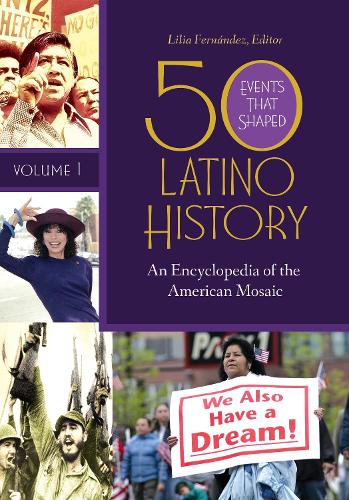
50 Events That Shaped Latino History: An Encyclopedia of the American Mosaic [2 volumes]
Publishing Details
50 Events That Shaped Latino History: An Encyclopedia of the American Mosaic [2 volumes]
By (Author) Lilia Fernndez
Bloomsbury Publishing PLC
Greenwood Press
22nd March 2018
United States
Classifications
Tertiary Education
Non Fiction
Ethnic groups and multicultural studies
Ethnic studies
Social and cultural history
973.0468
Physical Properties
Contains 2 hardbacks
2637g
Description
Which historical events were key to shaping Latino culture This book provides coverage of the 50 most pivotal developments over 500 years that have shaped the Latino experience, offering primary sources, biographies of notable figures, and suggested readings for inquiry. Latinospeople of European, Indigenous, and African descenthave had a presence in North America long before the first British settlements arrived to the Eastern seaboard. The encounters between Spanish colonizers and the native peoples of the Americas initiated 500 years of a rich and vibrant historyan intermingled, cultural evolution that continues today in the 21st century. 50 Events that Shaped Latino History: An Encyclopedia of the American Mosaic is a valuable reference that provides a chronological overview of Latino/a history beginning with the indigenous populations of the Americas through the present day. It is divided into time period, such as Pre-Colonial Era to Spanish Empire, pre-15211810, and covers a variety of themes relevant to the time period, making it easy for the reader find information. The coverage offers readers background on critical events that have shaped Latino/a populations, revealed the conditions and experiences of Latinos, or highlighted their contributions to U.S. society. The text addresses events as varied as the U.S.-Mexican War to the rise of Latin jazz. The entries present a balance of political and cultural events, social developments, legal cases, and broader trends. Each entry has a chronology, a main narrative, biographies of notable figures, and suggested further readings, as well as one or more primary sources that offer additional context or information on the given event. These primary source materials offer readers additional insight via a first-hand account, original voices, or direct evidence on the subject matter.
Reviews
College and secondary school libraries will find the volumes useful for students and undergraduates. Public libraries above all would probably be interested in having the volumes available as a reference work for the nonspecialist reader curious to learn more. * ARBA *
Author Bio
Lilia Fernndez, PhD, is the Henry Rutgers Term Chair in the Departments of Latino and Caribbean Studies and History at Rutgers University, New Brunswick, NJ.
